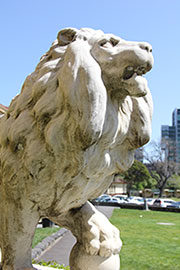
Knowledge of historical events (like the founding of Wesley College) inevitably leads those who live in the present to an ever greater understanding of themselves and the institutions to which they belong. So those who are interested in learning more about themselves or their institutions usually cast a backward look through history. As they look back, they occasionally succumb to the tantalising temptation to turn history into nostalgia. People often are heard to say, “Weren’t those days great? The world was simpler then. No threat of devastating war, no nuclear power plant meltdowns, no widespread dealers of drugs, no pollution, no diet fads, no middle-class guilt of trying to make a better life.”
In the old days, religious understandings and experiences were much simpler as well. Religious leaders of a century or more ago were much more confident that they knew the right answers than their descendants are today. Ambiguity was not on their radar as it is with religious leaders today. Certainty was much easier to come by 150 years ago when Wesley College was in the minds of early Wesleyan leaders in Melbourne.
Nostalgia sees history as a simpler time, a safer time, a more certain time, a less complex time. It leads people to believe that we would all be better off if only we could return to “the good old days” of no smartphones, no computers, no Facebook, days of less anxiety and more certainty. Nostalgia gives the impression that the present’s only hope is in recreating the past. In reality, of course, nostalgia is really an enemy of history because it distorts the true picture. The good old days were never as good as we imagine them to be.
In 1866 a characteristic of the religious world in Victoria was sectarianism. Not only was there division between Roman Catholics, Anglicans and Protestants, but even the Protestant churches were examples of disunity. The Methodists for example were splintered into many different denominations – Primitive Methodists, United Methodist Free Churches, Bible Christians, Free Connection and the bigger Wesleyan Methodist Church. As Andrew Lemon in his history of Wesley College, A great Australian school: Wesley College examined notes, there was a great deal of debate by the government of Victoria, to grant the main religious denominations of the colony parcels of land and funds to establish colleges for higher education. The Methodists were granted 2,768 pounds based on the number of adherents. Methodism of various kinds during this period increased its proportion of the population from 5.63% to 13.36% between 1851 and 1901, by its combination of lay preachers, class meetings and circuits and a vigorously evangelistic ethos. Also there was a dynamic leadership of clergy like Daniel Draper, James Waugh, and Walter Powell, who brokered a vision of Methodist Church committed to helping the needy and establishing a school based on Wesleyan values and beliefs.
James Waugh wished to express the two aspects of Methodism in the new school. One was a strict discipline to follow the teachings of the Christian faith and second an openness to all comers and to make “religion a positive force in their lives.” In the first intake of students in 1866, sixty four Wesleyan Methodists, fifteen Anglicans, nine Presbyterians, two Baptists, two Independents, two Quakers and a one Jewish student were enrolled. Today perhaps the second of these features of the College are still present in our openness to students of all faiths, creeds and nationalities, maintaining a core value that stretches back to our beginnings.
As we commemorate Founders’ Day this year perhaps a task for the College community is to embrace the challenge of what aspects or features of our past do we wish to nurture and affirm in the present and future of Wesley College? In the Wesleyan Chronicle of the time the aim of the College was expressed as “while Wesley College will be an establishment for Christian education, combined with the highest and best secular knowledge,” it will not be sectarian and will be open to all. With the decline of the Christian churches in modern society, how relevant is the College’s relationship to the Uniting Church? Terry Eagleton in his book Culture and the Death of God says “that societies become secular not when they dispense with religion altogether, but when they are no longer especially agitated by it.” So what is the place of religion in Church schools which are increasingly under the influence of secularism? In what ways does Wesley College embrace the values of its founders?
Rev James Waugh once said in a much quoted speech “The relation of the Church to the education of its youth is intimate. She is to purify the fountains of instruction. She is to encourage the expansion and improvement of the human mind…May our College be like an angel standing in the sun, sending forth streams of light for many a year throughout this land.” Perhaps I’m into nostalgia!
